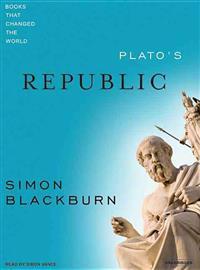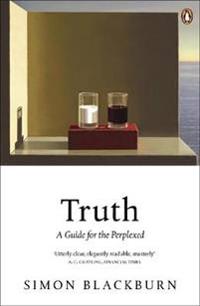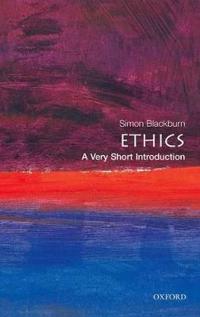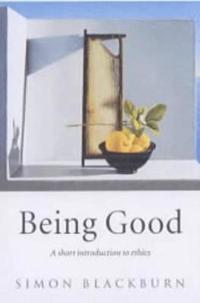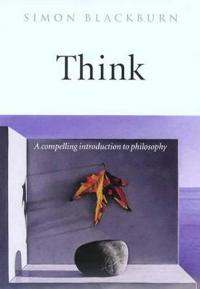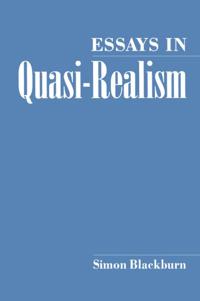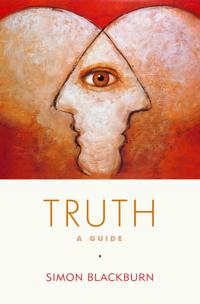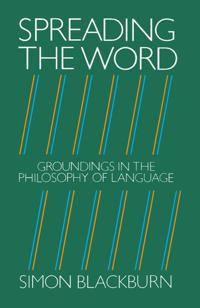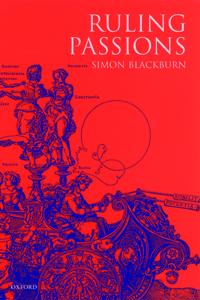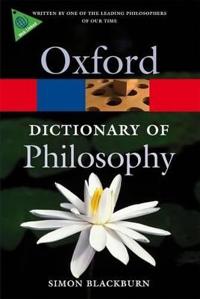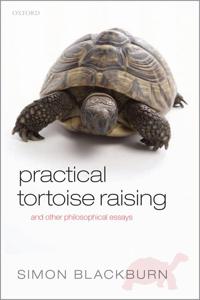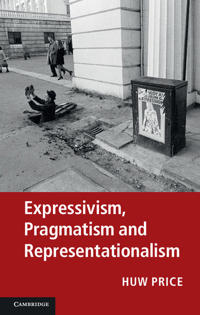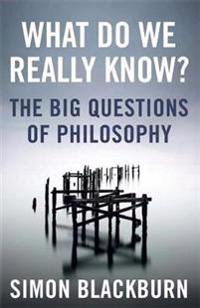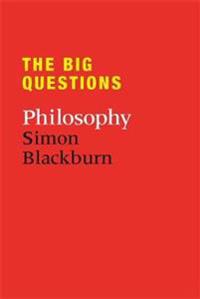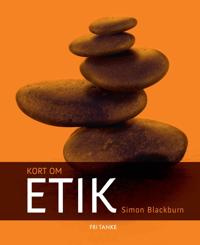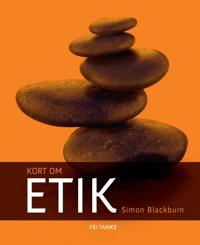Plato's Republic (CD-bok)
avSimon Blackburn, Simon (NRT) Vance, Simon Blackburn
ISBN: 9781400153909 - UTGIVEN: 2007-07Plato is perhaps the most significant philosopher who has ever lived, and The Republic, composed in Athens in about 375 BC, is widely regarded as his most famous dialogue. Its discussion of the perfect city-and the perfect mind-laid the foundations for Western culture and, for over two thousand year[...]
Truth (Storpocket)
avSimon Blackburn
ISBN: 9780141014258 - UTGIVEN: 200605This important book is about truth, and the enemies of truth, and the wars that are fought between them. As Simon Blackburn says in his introduction, "the ground is complicated, strewn with abandoned fortresses and trenches, fought over by shifting alliances". "Truth" is an essential sure-footed gui[...]
Think (Inbunden)
avSimon Blackburn
ISBN: 9780192100245 - UTGIVEN: 1999-08-05Written by the author of the bestselling "Oxford Dictionary of Philosophy", this book explains the big questions in life: knowledge, consciousness, fate, God, truth, goodness, justice. It is intended for those who think there are big questions lurking out there, but does not know how to approach the[...]
Ethics (Häftad)
avSimon Blackburn
ISBN: 9780192804426 - UTGIVEN: 200305This introduction to ethics tackles the major moral questions surrounding birth, death, happiness, desire and freedom, showing us how we should think about the meaning of life, and how we should mistrust the soundbite-sized absolutes that often dominate moral debates.[...]
Being Good (Häftad)
avSimon Blackburn
ISBN: 9780192853776 - UTGIVEN: 200203It is not only in our dark hours that scepticism, relativism, hypocrisy, and nihilism dog ethics. Whether it is a matter of giving to charity, or sticking to duty, or insisting on our rights, we can be confused, or be paralysed by the fear that our principles are groundless. Many are afraid that in [...]
Think (Häftad)
avSimon Blackburn
ISBN: 9780192854254 - UTGIVEN: 200103This is a book about the big questions in life: knowledge, consciousness, fate, God, truth, goodness, justice. It is for anyone who believes there are big questions out there, but does not know how to approach them. Think sets out to explain what they are and why they are important. Simon Blackburn[...]
Essays in Quasi-realism (Häftad)
avSimon Blackburn
ISBN: 9780195082241 - UTGIVEN: 199306This volume collects together some influential essays in which Simon Blackburn explores one of the most profound and fertile of philosophical problems: the way in which our judgements relate to the world. This debate has centered on realism, or the view that what we say is validated by the way thing[...]
Truth (Häftad)
avDistinguished Simon Blackburn
ISBN: 9780195315806 - UTGIVEN: 200612The author of the highly popular book Think, which Time magazine hailed as "the one book every smart person should read to understand, and even enjoy, the key questions of philosophy," Simon Blackburn is that rara avis--an eminent thinker who is able to explain philosophy to the general reader. Now [...]
Spreading the Word (Häftad)
avSimon Blackburn
ISBN: 9780198246510 - UTGIVEN: 1984-01Provides a comprehensive introduction to the major philosophical theories attempting to explain the workings of language.[...]
Ruling Passions: A Theory of Practical Reasoning (Inbunden)
avSimon Blackburn
ISBN: 9780198247852 - UTGIVEN: 1998-09-24Ruling Passions (Häftad)
avSimon Blackburn
ISBN: 9780199241392 - UTGIVEN: 200011Simon Blackburn puts forward a compelling original philosophy of human motivation and morality. He maintains that we cannot get clear about ethics until we get clear about human nature. So these are the sorts of questions he addresses: Why do we behave as we do? Can we improve? Is our ethics at war [...]
The Oxford Dictionary of Philosophy (Häftad)
avSimon Blackburn
ISBN: 9780199541430 - UTGIVEN: 200808This best-selling dictionary is written by one of the most famous philosophers of our time, and it is widely recognized as the best dictionary of its kind. Comprehensive and authoritative, it covers every aspect of philosophy from Aristotle to Zen. With clear and concise definitions, it provides liv[...]
Practical Tortoise Raising (Häftad)
avSimon Blackburn
ISBN: 9780199661763 - UTGIVEN: 201210Simon Blackburn presents a selection of his philosophical essays from 1995 to 2010. He offers engaging and illuminating discussions of various problems which arise when such familiar notions as representation, truth, reason, and assertion are applied in the sphere of practical thought. It is puzzlin[...]
Expressivism, Pragmatism and Representationalism (Häftad)
avHuw Price, Simon Blackburn, Robert Brandom
ISBN: 9780521279062 - UTGIVEN: 201305Pragmatists have traditionally been enemies of representationalism but friends of naturalism, when naturalism is understood to pertain to human subjects, in the sense of Hume and Nietzsche. In this volume Huw Price presents his distinctive version of this traditional combination, as delivered in his[...]
Mirror Mirror The Uses and Abuses of Self-Love (Inbunden)
avSimon Blackburn
ISBN: 9780691161426 - UTGIVEN: 2014-02Everyone deplores narcissism, especially in others. The vain are by turns annoying or absurd, offending us whether they are blissfully oblivious or proudly aware of their behavior. But are narcissism and vanity really as bad as they seem? Can we avoid them even if we try? In Mirror, Mirror, Simon Bl[...]
Expressivism, Pragmatism and Representationalism (Inbunden)
avHuw Price, Simon Blackburn, Robert Brandom
ISBN: 9781107009844 - UTGIVEN: 2013-05-16Presents Price's distinctive version of the traditional representationalism/naturalism combination, with commentary by four other major figures.[...]
Anatomy Questions for the MRCS (Häftad)
avChristopher Wood, Simon Blackburn, Advisory Editor: Faiz
ISBN: 9781405145077 - UTGIVEN: 2008-05-31Anatomy at a Glance, 3rd Edition (Häftad)
avOmar Faiz, Simon Blackburn, David Moffat
ISBN: 9781444336092 - UTGIVEN: 2011-04-30As one of the core basic sciences underpinning medical and clinical science, anatomy is a central discipline for medical students in the first years of medical schools worldwide. Without a fundamental understanding of gross anatomy, it is impossible to develop key clinical skills for examining a pat[...]
What Do We Really Know? (Storpocket)
avSimon Blackburn
ISBN: 9781780875873 - UTGIVEN: 201209In What Do We Really Know? Simon Blackburn addresses the twenty most-asked philosophical questions, including 'Can machines think?', 'What is the meaning of life?', 'Is death to be feared?', 'Why be good?', 'What am I?' and 'What do we really know?' Each 3000-word essay examines a question that has [...]
How to Read Hume (Pocket)
avSimon Blackburn
ISBN: 9781847080332 - UTGIVEN: 2009-09'Be a philosopher; but, amidst all your philosophy, be still a man' - David Hume. David Hume is generally recognized as the United Kingdom's greatest philosopher, as well as a notable historian and essayist, and a central figure of the Enlightenment. Yet his work is delicately poised between sceptic[...]
Big Questions: Philosophy (Inbunden)
avSimon Blackburn
ISBN: 9781849160001 - UTGIVEN: 200911Cambridge philosophy professor Simon Blackburn answers the key questions in philosophy - and provides easy-to-understand and enlightening answers.[...]
Kort om etik (Inbunden)
avSimon Blackburn
ISBN: 9789186061135 - UTGIVEN: 201012Vår självbild som moraliska, skötsamma varelser hotas av skepticism,relativism, hyckleri och nihilism. Har vetenskapen avslöjat oss människor som genetiskt programmerade att handla själviskt, tävlingsinriktat och aggressivt?
I Kort om etik tar sig Simon Blackburn an de största et[...]Kort om etik (e-bok)
avSimon Blackburn
ISBN: 9789186061272 - UTGIVEN: 201111Vår självbild som moraliska, skötsamma varelser hotas av skepticism, relativism, hyckleri och nihilism. Har vetenskapen avslöjat oss människor som genetiskt programmerade att handla själviskt, tävlingsinriktat och aggressivt?
I Kort om etik tar sig Simon Blackburn an de största [...]

